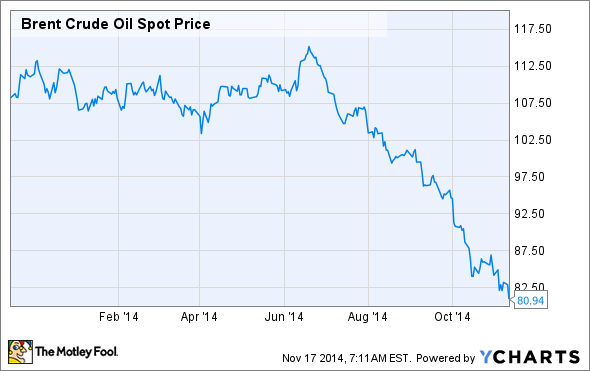The spot price of Brent Crude has fallen more than 20% over the last six months. That's taken oil from over $100 a barrel to around $80 a barrel. There have been many reasons given for the drop, including the U.S. energy boom. However, Royal Dutch Shell Plc (RDS.B) provided what could be the most frightening reason of all.
A global commodity
Oil is a global commodity; what happens in one country impacts what's goes on around the world. For example, the United States has pretty much kept its oil from the export market since the 1970s. That's caused all sorts of dislocations domestically.
Recently so much shale oil found its way to the Cushing Oklahoma hub that the inventory range between 2009-2013 was well above historical averages, according to the U.S. Energy Information Administration. There was just too much oil and not enough infrastructure to use it and move it (this situation is quickly being rectified). But this U.S. oil glut isn't just a U.S. problem.
Brent Crude Oil Spot Price data by YCharts
With more domestic oil available, the United States has been decreasing the amount of oil it imports. According to the EIA, oil imports fell 6% in the first half of this year. If the United States is buying less oil, that means there's more oil sloshing around to satisfy other countries' needs. Add to this that the U.S. is just starting to open up the oil export spigot, adding even more on the oil supply front, and you can see why market watchers are suggesting that the U.S. energy Renaissance is crimping oil prices.
What if it's deeper than that?
But Royal Dutch Shell presents a more disconcerting view. CFO Simon Henry suggests that the U.S. energy boom is making people focus too heavily on the supply side. He thinks the real problem could be demand: "More important is demand. Demand is weaker in emerging markets, which account for all of the growth in demand ..."
And that slow down was something of a shock to the market, with the International Energy Agency noting in October that, "... the abrupt slowdown in demand growth in 2Q14 has come as a surprise ..." In fact, the International Monetary Fund has lowered its global growth projections three times so far this year. The problem for oil, and so many other commodities, is that developed markets aren't going to drive the future.
Slow growth and, worse, conservation are the name of the game in economically advanced economies. For example, the United States, one of the strongest of the developed nations right now, is projected to grow gross domestic product 2.1% this year, up from 1.9% last year, according to the World Bank. That's nice, but China, one of the largest countries in the world is slowing down.

(Source: ENERGY.GOV, via Wikimedia Commons)
China's GDP growth is projected to slow from 7.7% last year to 7.6% this year. And because of the country's vast size (about 20% of the world's population lives in China and it's the second largest country by gross domestic product), that's enough to reduce growth in emerging markets in 2014 to 4.8%, despite more robust growth in many smaller markets. The GDP growth rate in Mexico, for example, is expected to double this year, but its population is less than a tenth the size of China's.
Getting ready for it
So if demand turns out to be a deeper problem than the market expects, the oil industry and investors could be in for more pain. Shell, for example, is pegging its models to oil prices as low as $70 a barrel. That's another 10% or so below the recent spot price. That said, Shell's Henry thinks $70 would represent the low point.
Still, the full effect of the current oil price decline may not have fully hit yet. Shell, for one, basically warned investors to brace for a tough fourth quarter because low oil prices are still working through the system. And if there's another 10% decline to come, things will get worse before they get better.
That said, if you are looking at oil, don't think this is the end of the world. First and foremost, oil is a commodity and its price is cyclical. So at some point in the future, higher oil prices are likely to show up. They always have in the past. And despite the U.S. oil boom, this vital energy source is getting harder to find overall. Thus oil stocks that take a hit from the current down swing could be bargains longer term. It just takes a steel will to buy them while they're getting hit.
How might oil prices head higher? As oil gets cheaper drillers have less and less reason to drill. That leads to less supply, which will eventually bring supply and demand back into balance, regardless of whether the problem is supply driven or demand driven, as Shell asserts. And demand could return just as quickly as it fell off if emerging market growth picks up again. Low oil prices could even help spur that growth, since a price drop for oil products like gasoline would put more money into consumers' pockets. Either way, market forces will, eventually, turn positive for oil and the companies that pull it out of the ground.





